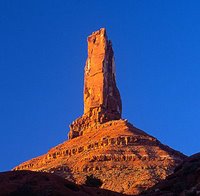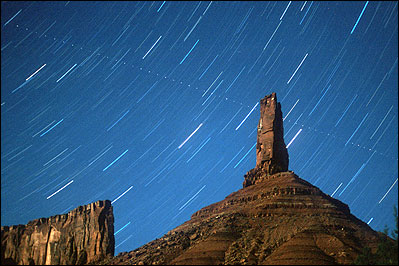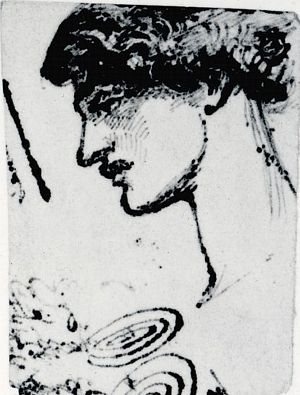Everything I learned tonight, I learned from Terry Tempest Williams.
My students and I have been working hard this week; I've been knocking down obligations and duties and assignments like dominos, but there are still many to go. I'm in a holding pattern--and not the kind I'd prefer, and not for any reason that I can legitimately regret, and not in any lasting way (which just makes the holding pattern all the more slow and overlong)--in another particular development. I'm missing people who are only near to me telephonically. The weather came up yellowy grey this morning, and I was up early enough to see it, and then it rained. Nothing has been particularly wrong, nothing particularly right; it's just felt as though we're moving through one of those weeks, and tomorrow it will be over.
 Terry Tempest Williams was on campus today. Because of other things I was learning and doing, I had to miss her morning conversation about creative writing, but I wouldn't have missed the evening lecture for anything--in fact, forced another meeting to be pushed back an hour so that I wouldn't have to miss it. I know Williams from her book Refuge: An Unnatural History of Family and Place (1991), which I read late in my teeth-gritted time in Rochester. I have a particularly lovely memory of sitting with Refuge in my favorite Indian restaurant, to which I treated myself innumerable times in those last weeks, knowing how heart-achingly I was going to miss it, and the waiters who knew who I was and who always gave me free desserts. Refuge is Williams's narrative of her family's fights with cancer (the result of nuclear testing in Nevada), intertwined with her record of the Great Salt Lake's unprecedented, unstoppable rising in spring 1983, a rising that ravaged local ecosystems. It is a minutely, painfully realized book, unsparing and surprising and haunting. And so it was tremendous to see her in person. She lives now in southeastern Utah, in Castle Valley near the instantly recognizable Castleton Tower and Arches National Park.
Terry Tempest Williams was on campus today. Because of other things I was learning and doing, I had to miss her morning conversation about creative writing, but I wouldn't have missed the evening lecture for anything--in fact, forced another meeting to be pushed back an hour so that I wouldn't have to miss it. I know Williams from her book Refuge: An Unnatural History of Family and Place (1991), which I read late in my teeth-gritted time in Rochester. I have a particularly lovely memory of sitting with Refuge in my favorite Indian restaurant, to which I treated myself innumerable times in those last weeks, knowing how heart-achingly I was going to miss it, and the waiters who knew who I was and who always gave me free desserts. Refuge is Williams's narrative of her family's fights with cancer (the result of nuclear testing in Nevada), intertwined with her record of the Great Salt Lake's unprecedented, unstoppable rising in spring 1983, a rising that ravaged local ecosystems. It is a minutely, painfully realized book, unsparing and surprising and haunting. And so it was tremendous to see her in person. She lives now in southeastern Utah, in Castle Valley near the instantly recognizable Castleton Tower and Arches National Park.At the beginning of her talk, Williams read from her Red: Passion and Patience in the Desert (2001), selecting for us a letter she'd written to a friend, describing why she writes. I had time to write down every seventh or eighth of her sentences, which worked out to be perfect, because the ones for which I was ready were the ones I wanted most anyway:
I write to make peace with the things I can't control.She asked three students who had attended the morning conversation about creative writing to produce writings for the evening lecture, and she gave them time and space to read what they'd written. The first young woman, who hails from Utah, seemed nervous, the kind of nervous I get at the edge of the one-meter diving board, but she had me at these lines, singing a paean to her home state: "You know, they have a paint color called Utah Sky. And it is the exact color of my sky."
I write to know beauty.
I write to migrating birds with the hubris of language.
I write as an act of slowness.
I write because I am unemployable.
I write by grace and grit.
I write knowing I will always fail.
Words are always a gamble, like broken glass...a bloody risk, like love.
She asked us three questions, then proceeded to tell us stories that might help us think about answering them. "What are we in the service of?" she asked. "What is our jurisdiction, and what is not? What do we choose to act on, and what not?"
She told us of a man known as Big Man, in Philadelphia, a recovered addict who became a tremendous mosaicist and helped to create an Alley of Angels, full of mosaiced Ethiopian angels, that could serve as a refuge for fearful children, a place where they could count on finding him or some other community elder. "The mosaicists took broken things and made them whole," she said.
She told us of a place where rocks tell time differently.
She told us that to care is neither conservative nor radical--that, instead, it is a form of consciousness.
And, when a student asked her how she had been able to spend a month in Rwanda this fall, acting as scribe for an artist who was designing and constructing a genocide memorial in a village of survivors, and to come out of the experience undamaged--when this student wanted to know, how do you witness and live, how do you listen and create and not sink under the weight of it all--she told us that when she'd come home, she hadn't been able to move, and that in the aftermath of her younger brother's death a year ago, she'd only written two pages. But, she pointed out, you get through things by going to them, by doing them, going through them, thinking about them, caring for others during them. "When I'm incapacitated," she said, "I'm thinking about myself."
And she quoted one of Emily Dickinson's letters, gifting us words that I wouldn't try to surpass tonight, even if I thought I might: "Life is a spell so exquisite, everything conspires to break it. How can we not respond?"

sources for today's images: 1) a webpage about climbing around Moab, UT; 2) Abrahm Lustgarten's article about how he captured this fabulous long-exposure nightshot of stars around Castlerock. The dotted line, he tells us, is the regular blink of a passing airplane's winglights.


0 Comments:
Post a Comment
<< Home